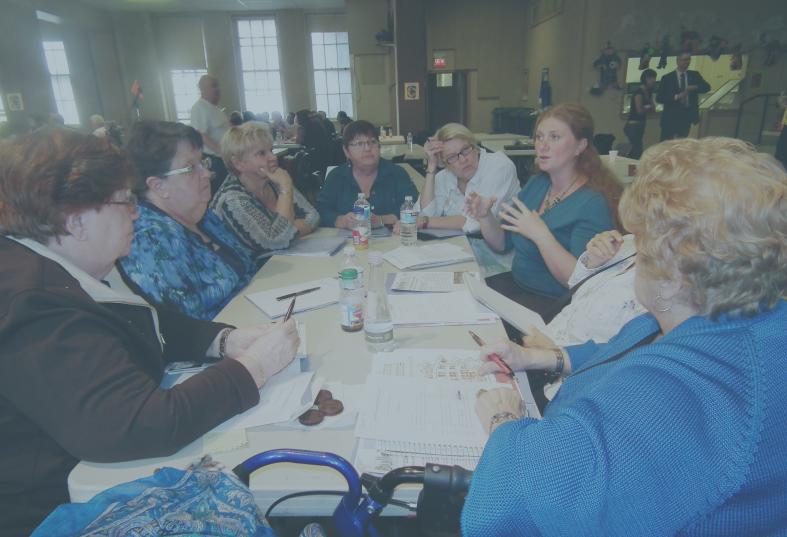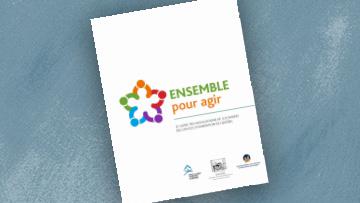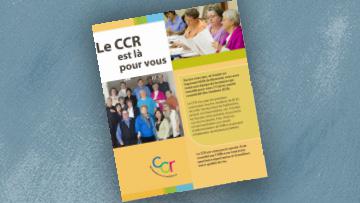
Tenants taking charge of their living environments
“The tenant committees are one of the main reasons why our initiatives succeed.” — Elaine St-Onge, OMHM
Tenant associations
Tenant associations promote group living and empower tenants to take charge of their living environments. They became part of the OMHM landscape back in the early 1980s. A subsidy program, active since 1987, supports association activities in the buildings.
More than a hundred associations represent just over 10,000 people in the low-rent housing projects. Many members of these associations also belong to the Fédération des locataires d’habitations à loyer modique du Québec (FLHLMQ), a federation of low-rent housing tenants in Québec. Creating a tenant association:
- Promotes tenant participation and empowerment in managing low-rent housing projects;
- Resolves common problems as they appear;
- Ensures that the living environment meets everyone’s needs;
- Encourages respect for all tenants within the living environment;
- Ensures representation within different groups;
- Provides recreational, support, educational, cultural and social activities.
Need help to create a tenant association?
Are you an OMHM tenant? If you need help to create a tenant association, community organizers are the OMHM resource persons ready to lend a hand. They assist tenants who want to create associations, support existing associations and foster the development of social and community development activities in the housing projects in collaboration with local groups.
For all the information you’ll need to create an association, visit the FLHLMQ website or: Comment fonder une association de locataires (in French)

Together for Action
Consult the low-rent housing tenant association guide, Ensemble pour agir (in French), published by the Regroupement des offices d’habitation du Québec, the Office municipal d’habitation de Montréal and the Fédération des locataires d’habitations à loyer modique du Québec.
Common room management by tenant associations
From the time that tenant associations were first created, the OMHM put them in charge of managing common rooms under an agreement with elected representatives of the tenant committee. The OMHM pays a variable subsidy based on the number of housing units, particularly to cover mandatory insurance costs. OMHM employees maintain the common rooms.
In housing projects that have no tenant association, a tenant might volunteer to take charge of the room. In these cases, the tenant must be approved by the OMHM and confirmed by other residents to manage the room’s use for the greater good of all concerned.
Advisory Committee of Tenants
The Advisory Committee of Tenants (ACT) speaks for all tenants. Its role is to assess tenant needs and priorities and submit recommendations to the OMHM general management and Board of Directors (Board).
The ACT studies policies that affect all tenants and sets administration budget priorities. It includes two tenant members of the Board and representatives of the sector committees with ties to the tenant associations. Members are volunteers elected at sector committee meetings. The ACT meets about ten times a year and intermittently for special projects or sub-committee purposes to discuss specific topics.
For details about ACT members, visit our page at Participative governance.
You can contact the ACT by email: ccr.mtl@gmail.com.

Consult the ACT brochure (in French).
Sector committee participation
The OMHM's activities are grouped into seven sectors. Each committee is composed of tenants from the associations. They identify their common issues and try to find solutions with OMHM representatives.
The sector committees are a privileged place of exchange between the tenants, an OMHM manager and a community organizer. Each sector committee meets about five times a year to discuss the main concerns of the tenants.
OMHM Board of Director’s representatives
Two tenants sit on the OMHM Board of Directors (Board). Elected once every three years by tenant association representatives, they automatically become members of the ACT. They represent all tenants on the Board, and have a hand in OMHM decisions and major policy directions.
Selection Committee participation
Three tenants (one of them a substitute) elected by tenant association representatives sit on the OMHM selection committee. The committee’s job is to advise the Board of Directors on applicant eligibility and classification based on the By-law respecting the allocation of dwellings in low rental housing (CQLR, c S-8, r 1).
Committee responsible for reviewing housing transfer applications submitted for biopsychosocial reasons
Tenant association representatives elect one tenant and one substitute to this committee. Its role is to analyze housing transfer applications made for biopsychosocial reasons, in other words, when a tenant’s health or safety is at risk or has become seriously impaired.
Participation in a maintenance and janitorial audit process
The OMHM has created an audit procedure to ensure the quality of maintenance and janitorial services in its housing projects. Tenants elected from each sector participate in inspection visits conducted in a different sector, along with OMHM managers. The team, varying from one sector to another, performs these inspection visits to assess the general condition of a building, although it does not enter individual units.
Youth participation
Young people living in low-rent housing projects in Montréal have formed a movement, called MOUV, to get actively involved in their community, learn how OMHM consultation forums operate and make their voices heard in a coordinated way.
The group of about 15 members between 12 and 25 years old meet on a regular basis to discuss needs and organize activities. They sometimes meet with OMHM management to voice these needs and share ideas.
For more information about youth involvement, visit the Room for youth page.
Other tenant consultations and involvement
In addition to including tenants as official participants in various bodies, the OMHM also consults them at different times. In this way, tenants are able to influence decisions that directly concern them. This happens, for instance, when certain major works take place in a building.
In addition, tenants are consulted on matters that could possibly affect their living environment, like the sanitation action plan or the enactment of a new law (like the law on cannabis).
Participation by ENHARMONIE residence tenants
The ENHARMONIE Advisory Committe of Tenants, created on a temporary basis in 2014, became a permanent fixture in June 2018. Each ENHARMONIE residence can send two representatives to sit on this committee. The two tenants elected to the OMHM Board of Directors are also members of this committee.
Topics of discussion resemble those covered by the low-rent housing project ACTs. Member talk about issues related to building management, services, community development, budget policy and more.
Participation by tenants from other buildings
One tenant association serves the tenants living in Benny Farm buildings. It is the oldest tenant association in Canada.
For more information about the Benny Farm Tenant Association, call 514 483-4118.
